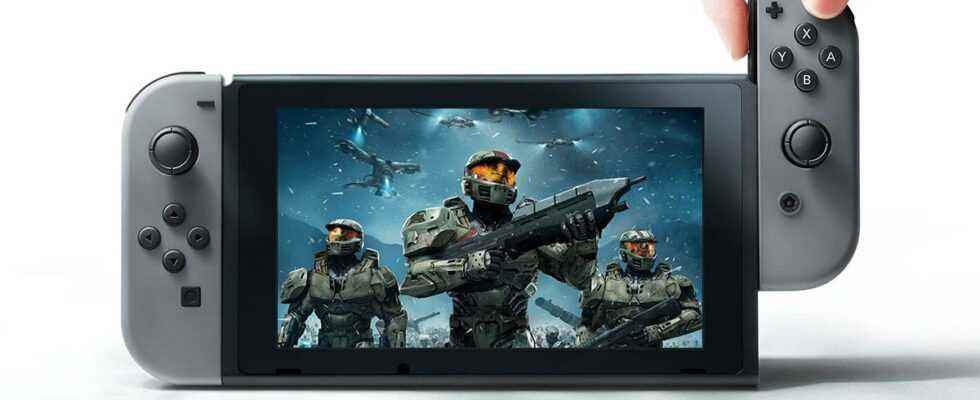Could Microsoft be developing its first portable Xbox game console? Many rumors have been going in this direction for several years, but the reason and the reality of the strategy put in place by Xbox do not necessarily go in this direction. We have considered the possibilities.
Fueled by the success of the Nintendo Switch and the arrival of cloud gaming, the fantasy of an Xbox portable console developed by Microsoft has germinated in many minds and been the subject of corridor noise since the launch of generation 9 in 2020.
The most attentive fans of the brand may have noticed the winks sent by certain well-accustomed Microsoft journalists. We can now say that the teams of the firm are thinking about a portable device going in this direction. But, between thinking about a product, announcing it and marketing it, there are obviously huge steps to take. In other words, it is a device that may never see the light of day in the end. Plans can change as the other said.
While waiting for possible leaks that would allow us to better understand this project, let’s think about the different paths that Microsoft could pursue. One can also wonder if such a device would really make sense in Xbox’s current strategy.
Native games or cloud gaming?
Before looking at the different hypotheses, one last point of explanation to clarify. Today there are two main ways of thinking about a portable device capable of offering video games to consumers. You can either create a device capable of running games natively and that requires convincing game developers to tailor their titles for your machine specifically, often with significant constraints on game performance or graphics quality. This is the path taken by Nintendo for the Switch or by Valve with the Steam Deck.
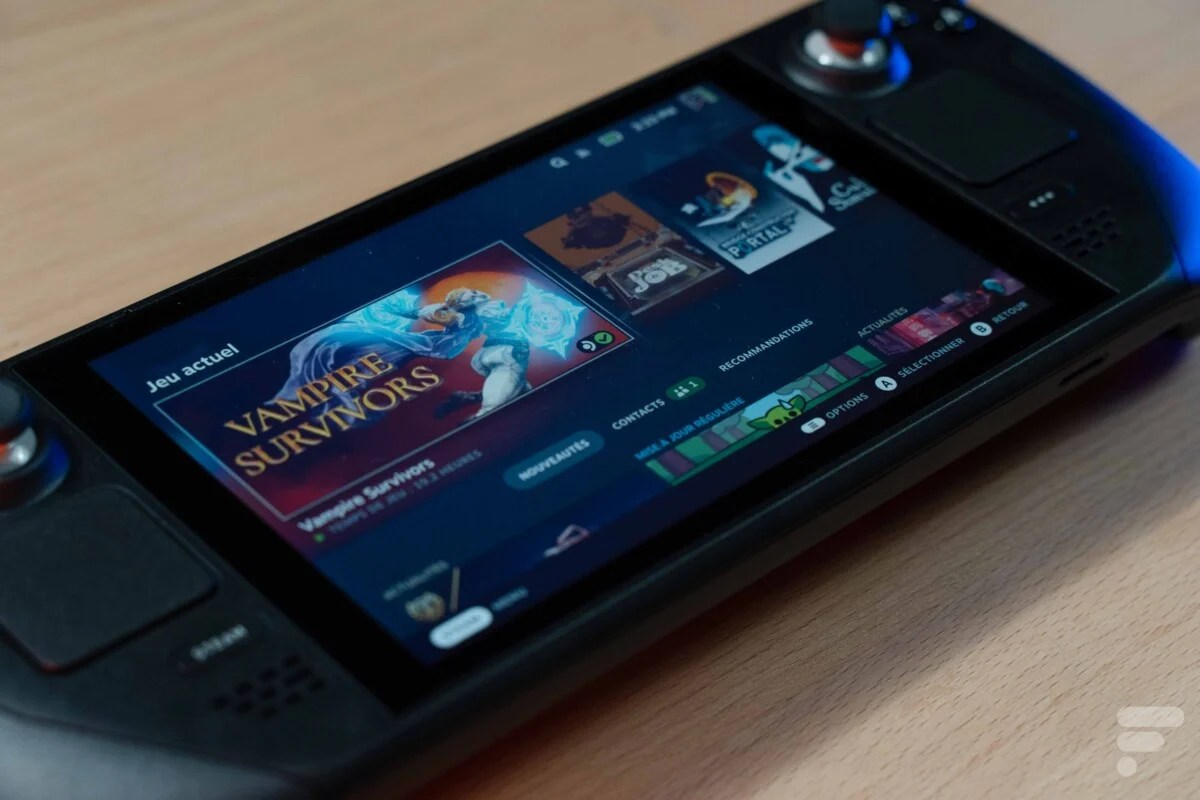
The other path is that of cloud gaming. This makes it possible to deport the need for computing power to the servers of the service publisher, and therefore to considerably lighten the mobile device which is then content to read a video stream and send commands from the joystick. In principle, this greatly facilitates the catalog of games available on the device. The downside is that it requires an excellent connection, wireless in addition. Another problem: as soon as you leave your home, you absolutely need a 4G or 5G connection to continue playing.
Note that nothing prevents a console in the first hypothesis from also accessing cloud gaming. Several games available on Nintendo Switch are available thanks to cloud gaming (Kingdom Hearts and control for example, A Plague Tale: Requiem soon), often at the cost of a very degraded user experience.
We know Xbox’s appetite for cloud gaming, so it’s a crucial question when we imagine a portable console developed by Microsoft.
Hypothesis 1: a portable Xbox Series S
Despite months and months of Xbox Series S leaksLockhart“, the arrival of the small Microsoft console next to the Xbox Series X was a nice surprise. This extremely compact console for a new generation product impressed us during our test. To the point of imagining a portable version of this console?
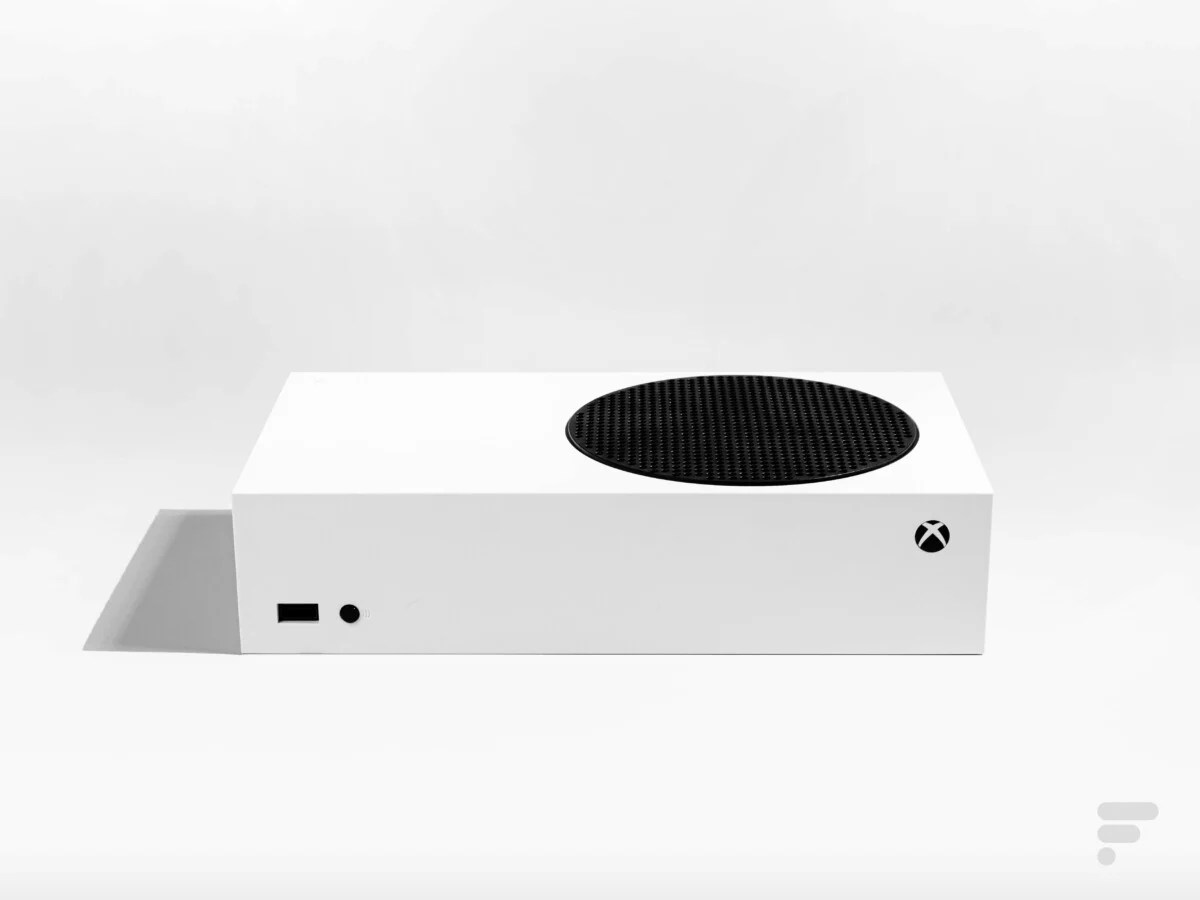
The idea is not stupid. It would allow Microsoft to guarantee that all the Xbox Series S games that we know today will be compatible with this possible portable version. Unfortunately, it seems impossible to achieve in the state. Indeed, the Xbox Series S consumes 80 to 85 watts and is equipped with a 165 watt power supply. We are a long way from the 20 watts used by the Steam Deck with the same type of architecture.
To reduce this consumption, it would be necessary to rely on the next generation of AMD components, but in this case, the architecture of the machine is changed and the compatibility of the games is no longer guaranteed as simply. Same thing if we decide to reduce the display definition while the Xbox Series S is designed to go from 1080p to 4K.
Hypothesis 2: a dedicated portable console
Microsoft could also choose to develop a brand new game console, unrelated to the characteristics of the Xbox Series S and X. This choice has the advantage of allowing Microsoft to design a tailor-made product like the Steam Deck. from Valve, with controlled consumption and computing power limited to displaying games at 720 p (or approaching). There, we can even imagine Microsoft using the next AMD Zen 4 and RDNA 3 architectures to improve efficiency and offer something very convincing against Nintendo and Valve. Proximity constraints with the Xbox Series S and X are no longer relevant in this scenario.
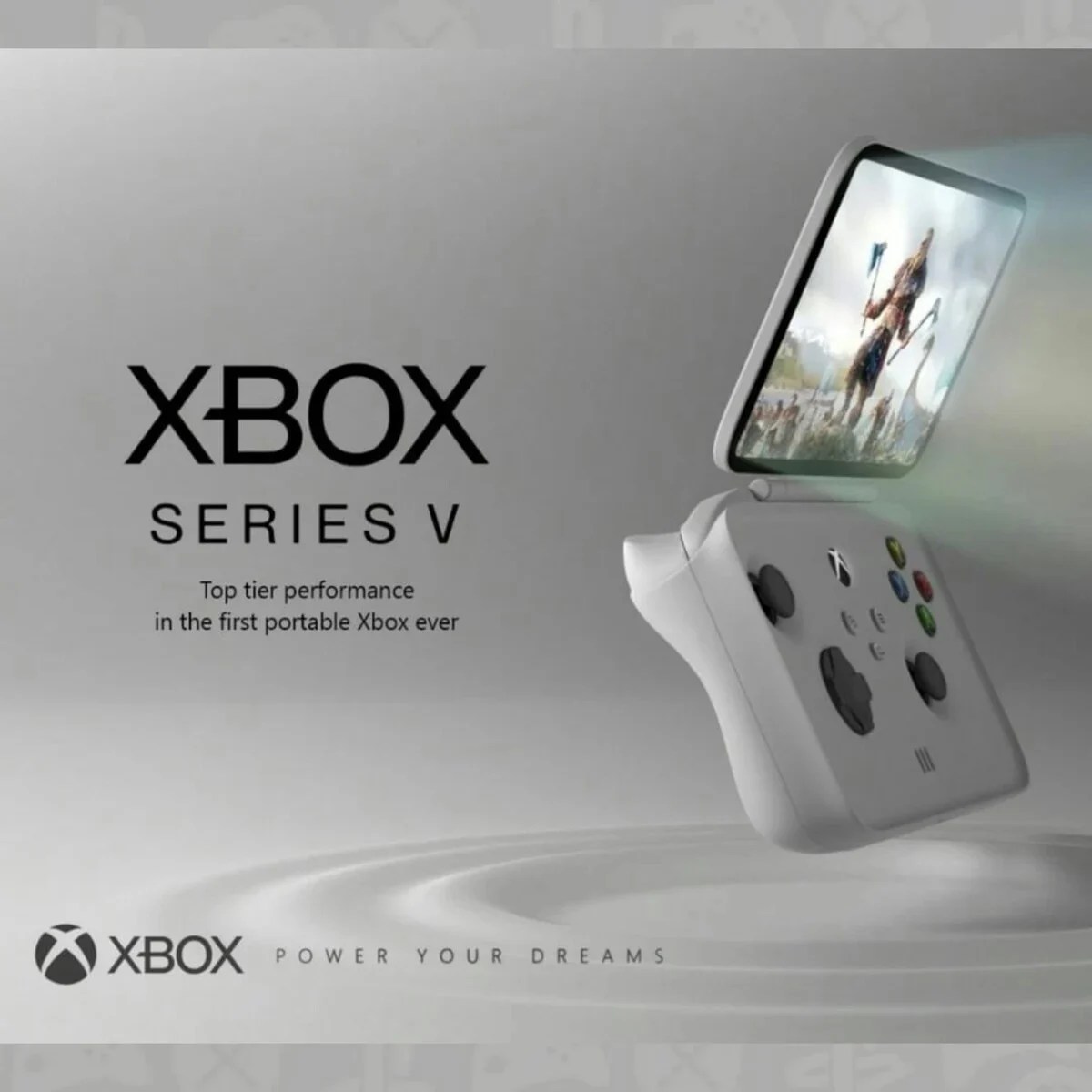
However, the downside of this assumption lies in the constraints for video game creators. The number of versions to deploy of a game has multiplied over the last generation. Now cross-platform game can release on PlayStation 4, PlayStation 4 Pro, PlayStation 5, Xbox One, Xbox One X, Xbox Series S, Xbox Series X, Nintendo Switch, PC (Steam), Steam Deck, Xbox Cloud Gaming, Google Stadia , Epic Games Store, Android, iOS. For each of these versions, the developers have to make adaptations of the game. The launch of a new Xbox console in this hypothesis would imply a completely new performance profile for the game.
It is then necessary to create a virtuous circle: to be followed by the developers, Microsoft should succeed in selling enough portable Xbox consoles. Otherwise, the developers could simply decide to ignore this machine, as was the case in part for the Wii U or the PS Vita in their time.
Hypothesis 3: a console dedicated to cloud gaming
The idea that may immediately come to mind for many gamers when considering a portable Xbox would be a console designed for cloud gaming. We then remove the constraints both on performance, since the games do not run natively on the machine, and on adaptation by game developers.
As explained above, the problem with this hypothesis is the limitations of such a machine. If it is not 4G or 5g compatible, you can’t play as soon as you leave your house. This also implies a mandatory Xbox Game Pass Ultimate subscription to use the device.
Hypothesis 4: a gaming laptop
It’s a scenario that we think less of, Microsoft offers a range of PCs with its Surface family and we know that the same engineers are responsible for creating the Xbox. One could imagine a Surface product for the first time really aimed at an audience of gamers. Several Surface devices have in the past integrated the Xbox Wireless protocol to easily connect an Xbox controller without using Bluetooth.
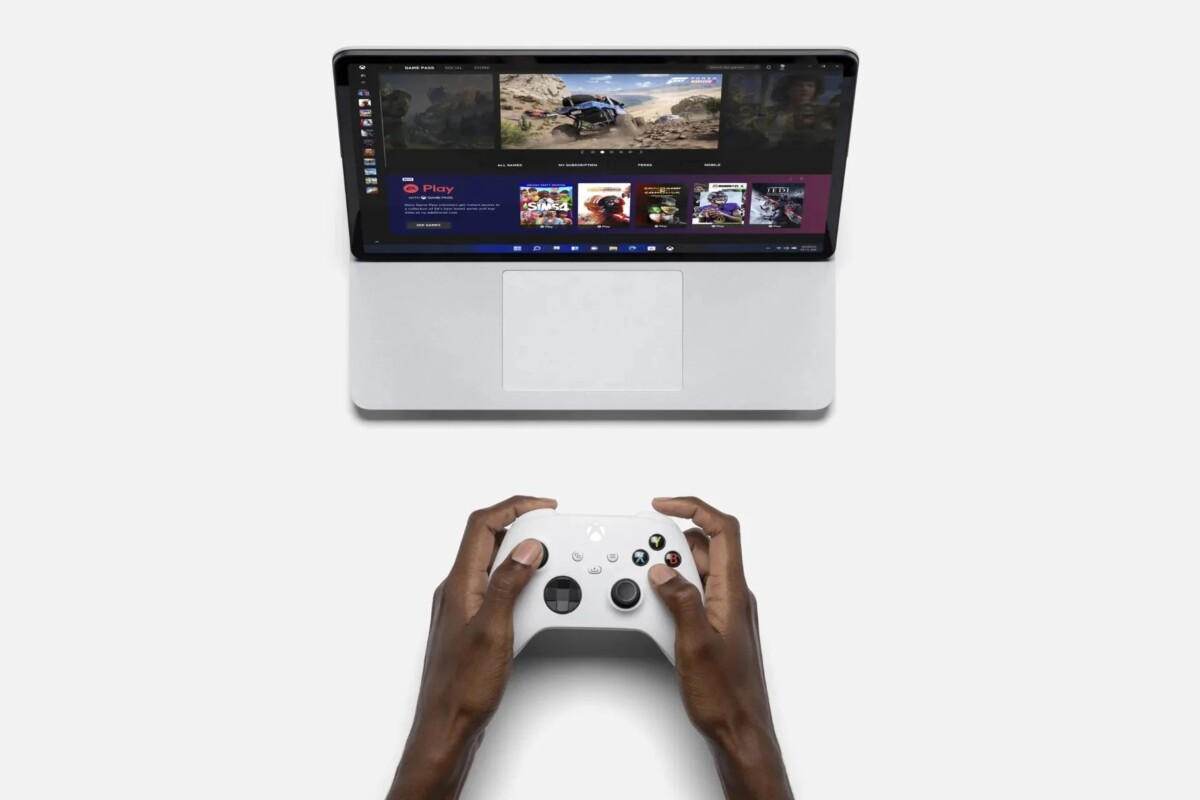
In this scenario, Microsoft would have the option of using the architecture of the Xbox Series S to make an ideal portable PC for video games without creating a machine that is too bulky. Cost rationalization with the Series S would limit the selling price. On the other hand, we would speak in this case of a Windows PC, which no longer has much in common with the idea of a portable console.
Do such ideas really fit into the Xbox Everywhere strategy?
The Xbox Everywhere strategy put in place by Microsoft is quite simple to understand. It’s about offering Xbox games on as many screens as possible, around the world and with as many players as possible. If we take the definition of strategy, it is even a matter of offering the games on “devices you already own“.
This is where we can talk about the elephant in the room. Does Microsoft really need to market a portable console when any smartphone can already turn into a console with cloud gaming and a simple controller? Of course, the firm can always add a string to its bow with such a new product, but that would not allow it to seek out a new audience. It’s much smarter to offer Xbox Cloud Gaming on the Steam Deck and still negotiate with Nintendo to one day land it on Switch.
It is natural that this kind of device is under study within Microsoft, and perhaps the firm will manage to solve this equation to offer an interesting device. In our opinion, among the hypotheses we have proposed, scenarios 2 and 4 hold our attention, but we do not imagine Microsoft embarking on this generation of console. The Nintendo Switch has created emulators, but by offering Xbox games on consoles, PCs, mobiles and even directly on televisions, Microsoft does not really need to offer a dedicated portable console like the Switch.
To follow us, we invite you to download our Android and iOS application. You can read our articles, files, and watch our latest YouTube videos.
